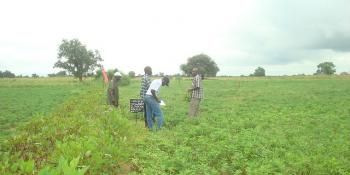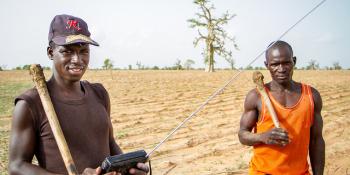Supporting the adoption of a digital emergency response system in Costa Rica

Summary
The Ministry of Agriculture and Livestock (MoAL) of Costa Rica worked with paper-based data, which hindered their response to emergencies. To increase adequate emergency responses to extreme climate events, Research Program on Climate Change, Agriculture and Food Security (CCAFS) and Bioversity International assisted the local government of Siquirres by piloting a digital system for data collection and decision-making. This pilot was scaled up to collect data on 3575 affected households and inventory USD 57 million of damages after Hurricane Otto. It enabled the MoAL to draft a detailed response plan to both restore agricultural infrastructure and increase climate resilience.
Background
Costa Rica is prone to extreme weather events, but until recently the Ministry of Agriculture and Livestock relied on paper-based data collection to organize its emergency responses. This system led to slow responses and rushed decision-making based on partly processed data. With climate change, the frequency and intensity of extreme climate events will increase, thus timely and adequate emergency responses become more important.
For this reason, Bioversity International engaged with the Ministry to demonstrate the relevance of its work on agro-climatic risk management to Costa Rica, relying on its experience with CCAFS’ AgroClimas program in Guatemala. In late 2015, Bioversity assisted the local government of Siquirres with its emergency response to flooding, piloting a digital system for data collection and decision-making. The pilot was successful and built mutual trust among partners in Costa Rica.
In the aftermath of Hurricane Otto, which struck Costa Rica in November 2016, the Minister of Agriculture and Livestock requested Bioversity to scale up the pilot. More than 300 field experts were trained to assess the damage of the hurricane on farms and send that data through a mobile application to central servers. This way, Bioversity and the Ministry could collect data of 3575 affected households and inventory USD 57 million of damages faster than ever before. This inventory enabled the Ministry to draft a detailed response plan to both restore agricultural infrastructure, for example fences and irrigation, as well as to increase climate resilience, for example by installing drainage systems. As a next step, Bioversity is working with the MoAL to draft a long-term plan to increase the resilience of farmers for future extreme weather events.
Key facts
- After a successful pilot, the Costa Rican Ministry of Agriculture and Livestock requested Bioversity to scale up their digital emergency assessment tool nation-wide.
- More than 300 field experts were trained to use the digital emergency assessment system
- In the aftermath of Hurricane Otto, data on damages was collected from 3575 farmer households, developing the damage inventory of USD 57 million.
Lessons: Key elements of success
- The experience with the CCAFS’ AgroClimas program in Guatemala opened the door for Bioversity at the Ministry of Agriculture and Livestock in Costa Rica.
- The pilot program in Siquirres was crucial to build the institutional relationship and trust between Bioversity and the Costa Rican government to scale up the program after Hurricane Otto.
Further reading
- 2016 Annual Report story: Costa Rica adopts digital emergency response system in wake of Hurricane Otto
- Bioversity blog: Partnering with Costa Rica to help farmers face climate change
- Press release by the Costa Rican government on emergency response plan (in Spanish)
- Press release on Reuters: Emergency drought-drills to help Guatemala adapt to a drier climate



